13928589749_ed056ccace_o
Do you have any thoughts on this post?
A brief history of the Clean Water Act and how an EPA rule could strip many streams and wetlands of its protection
In 1969, the Cuyahoga River in downtown Cleveland was so polluted by the steel mills that lined its banks the water literally caught fire. Sparks from a passing train turned into flames that billowed five stories high, causing $50,000 worth of damage, destroying a bridge, and halting rail travel. It was a national media event that spurred Congress to pass a series of landmark environmental laws, including the Clean Water Act, to clean up and protect America’s water.
Since the early 1970s, the Clean Water Act has been wildly successful, resulting in the restoration of hundreds of thousands of miles of rivers and streams that are now safe for fishing and swimming. The Act has helped hold polluters accountable and prevent 700 billion pounds of toxic pollutants from entering our nation’s waters each year.
Unfortunately, 40 years later the current administration is proposing to weaken its responsibilities under the Clean Water Act by redefining which waters are protected.
If you read the debate from when Congress passed the Act, it’s clear that Americans didn’t just want to protect large rivers that can accommodate barges. We wanted a comprehensive national program that preserved places like the Cuyahoga River in the east and the smaller headwaters trout streams in the West.
We must remember that intent as we gear up for yet another fight for clean water.
Some will falsely claim the Trump Administration’s proposed clean water rule is simply undoing what the Obama Administration put in place. But in 2015, the Obama Administration protected an additional 5 percent of streams under the Clean Water Act. Now the EPA and the Army Corps of Engineers are proposing to undo far more than that. The new rule would eliminate protections from more than 18 percent of the nation’s stream miles and more than 50 percent of our remaining wetlands, including critical habitat for fish, ducks, and other migratory birds.
This new proposal would reverse decades of protections that were put in place to ensure clean water would be available for future generations. If this plan goes into effect, every hunter and angler stands to lose.
So now what? As a partnership that exists to ensure all Americans have great places to hunt and fish, the TRCP asks sportsmen and women to raise their voices. With all the other threats to our nation’s waters, now is not the time for the federal government to abandon its responsibility to conserve the streams and wetlands that support healthy fisheries and flyways.
Take action today and tell the EPA its proposal puts our nation’s water at risk.
Photo courtesy of Cleveland State University Library.
Public comment period opens today on rule that would exclude many streams and wetlands from Clean Water Act protections
The Environmental Protection Agency today officially published a proposed rule that would roll back protections for 50 percent of wetlands and 18 percent of stream miles in America. This kickstarts a 60-day comment period for Americans to weigh in on the proposed rule, which does not include Clean Water Act protections for ephemeral streams—those that only flow after rainfall—and wetlands that are not connected to other waters.
The Theodore Roosevelt Conservation Partnership is calling on individual sportsmen and women to respond by April 15 and urge the EPA not to overlook critical fish and waterfowl habitat.
“Clean water is vital to our hunting and fishing traditions and the booming outdoor recreation economy,” said Whit Fosburgh, the TRCP’s president and CEO. “This proposal disregards the importance of smaller streams and isolated wetlands and the Clean Water Act’s 40-year track record of improving America’s waterways. A rollback of this magnitude puts fish and wildlife at serious risk. The EPA must listen to the millions of sportsmen and women who rely on clean water.”
Before finalizing the 2015 clean water rule, the EPA held a 120-day comment period and ultimately allowed the public a total of 200 days to respond to the proposal. The EPA is now only giving the public just 60 days to submit feedback on the replacement rule.
“The agencies need to give sportsmen and women sufficient time to speak out, given the gravity of this rule,” said Fosburgh. “Sixty days is not enough.”
Callie Easterly’s work at The Conservation Fund is helping to expand hunting and fishing access on a national wildlife refuge by more than 12,000 acres—read the latest Q&A in our Women Conservationist Wednesday series
We love talking to women in the conservation workforce who are very clearly forces of nature themselves. Callie Easterly, a native Texan and the senior major gifts officer at The Conservation Fund, is no exception.
Forget for just a moment that she runs an incredible hunting lodge for the organization, hosting small parties of waterfowl hunters to showcase the benefits of wetland restoration projects. Now consider that in the span of eight years she went from receptionist to executive director of a nonprofit focused on getting inner city kids outdoors and in touch with their food. That’s before she helped build a sustainable grazing program on conserved lands in the unique Gulf coastal grasslands of Texas.
But back to that hunting lodge. It’s on the 12,376-acre Sabine Ranch, which will soon be added to McFaddin National Wildlife Refuge as public land open to hunting, fishing, hiking and birdwatching. And Callie helped raise the more than $30 million needed to piece the original ranch back together and convey the land to the U.S. Fish and Wildlife Service.
Her story is so compelling, it’s no wonder she can convince people to open their wallets for conservation. She shares a little bit of that story with us here.
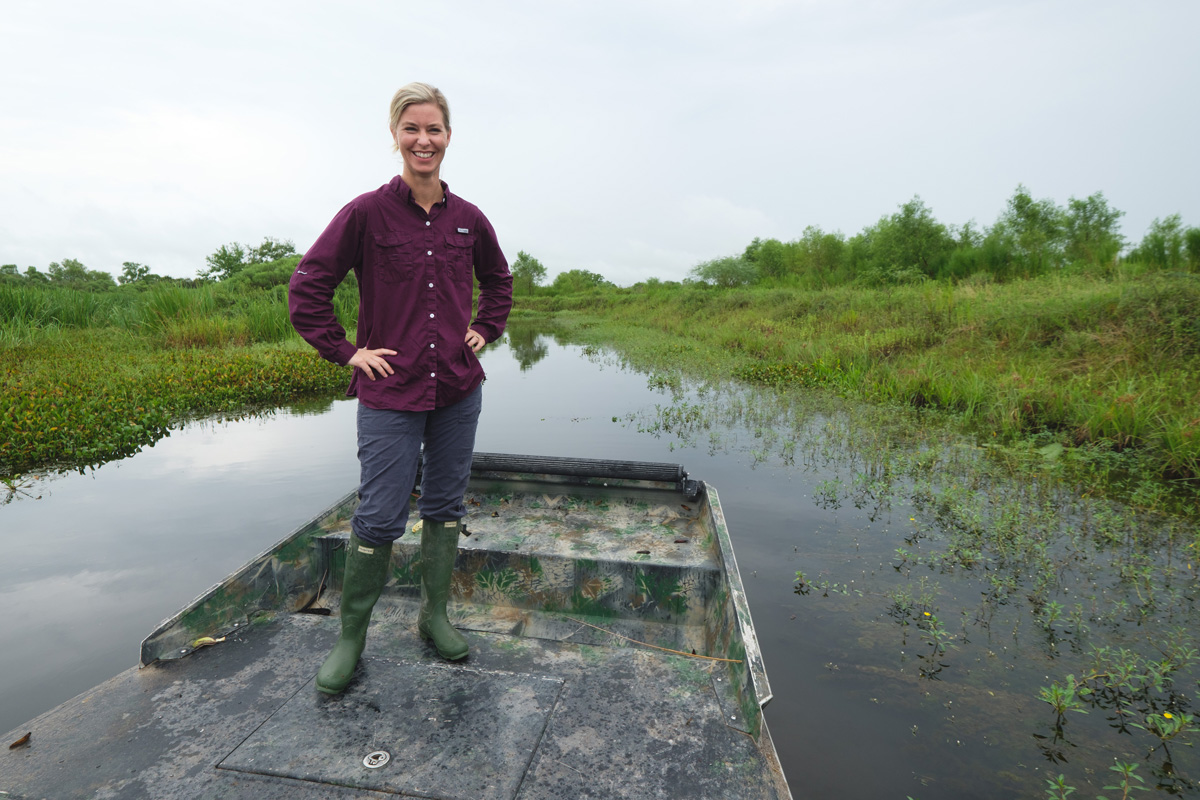
TRCP: How were you introduced to the outdoors?
CALLIE EASTERLY: I grew up in a small town outside Houston with a lot of rice farms, and I started hunting deer with my dad on the Thanksgiving holidays. Our local grocery store offered these individual meat lockers to store your venison, and we basically lived off what we harvested. I shot my first deer when I was 9 years old and totally got the bug.
For a while, I lived in Seattle and did more fishing, but when I came back to Texas and met my husband—he’s an avid outdoorsman—I really got back into hunting. And I was able to marry it with my lifelong interest in gardening and knowing exactly where my food comes from.
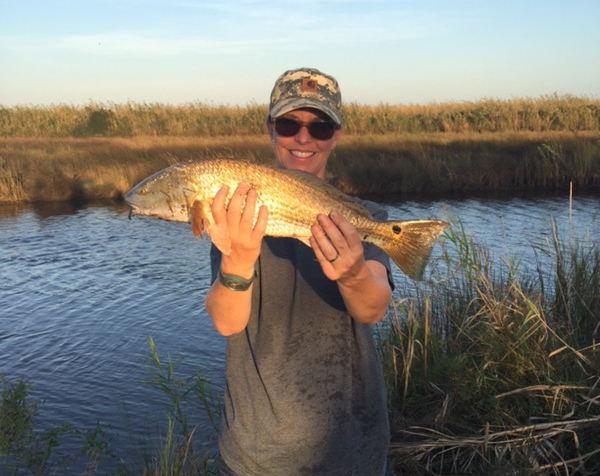
TRCP: And what led you to work in conservation?
EASTERLY: It started out as kind of a fluke. I was working with adults with disabilities and interpreting sign language, and I loved being able to help people communicate, but I really felt like I was missing out on sharing this growing passion I had for gardening and food security. I didn’t know exactly how I was going to do it, but I quit my job and ended up working as a receptionist for a Houston nonprofit called Urban Harvest, which builds gardens at inner city schools and takes kids into the outdoor classroom to learn about nutrition.
After only a few weeks, their fundraising person quit and they needed someone to write a grant application—so I tried it. We got the grant and things just took off from there. By the end of my eight years there, I had become executive director and was meeting a lot of inspiring people in the food movement.
Eventually, I wanted to do more with sustainable agriculture, and I got the opportunity to go back to my roots—literally my hometown of Katy, Texas—and work for the Katy Prairie Conservancy. One of the preserves is a working cattle ranch, where I was able to build a program that uses cattle as a land management tool for the benefit of other wildlife and water quality. And when I got the call from The Conservation Fund, I’d been consulting for a number of organizations on how to harness those Gulf oil spill recovery dollars to improve wildlife habitat and shellfish populations. So, it’s been a slow growth into my role at Sabine Ranch today.
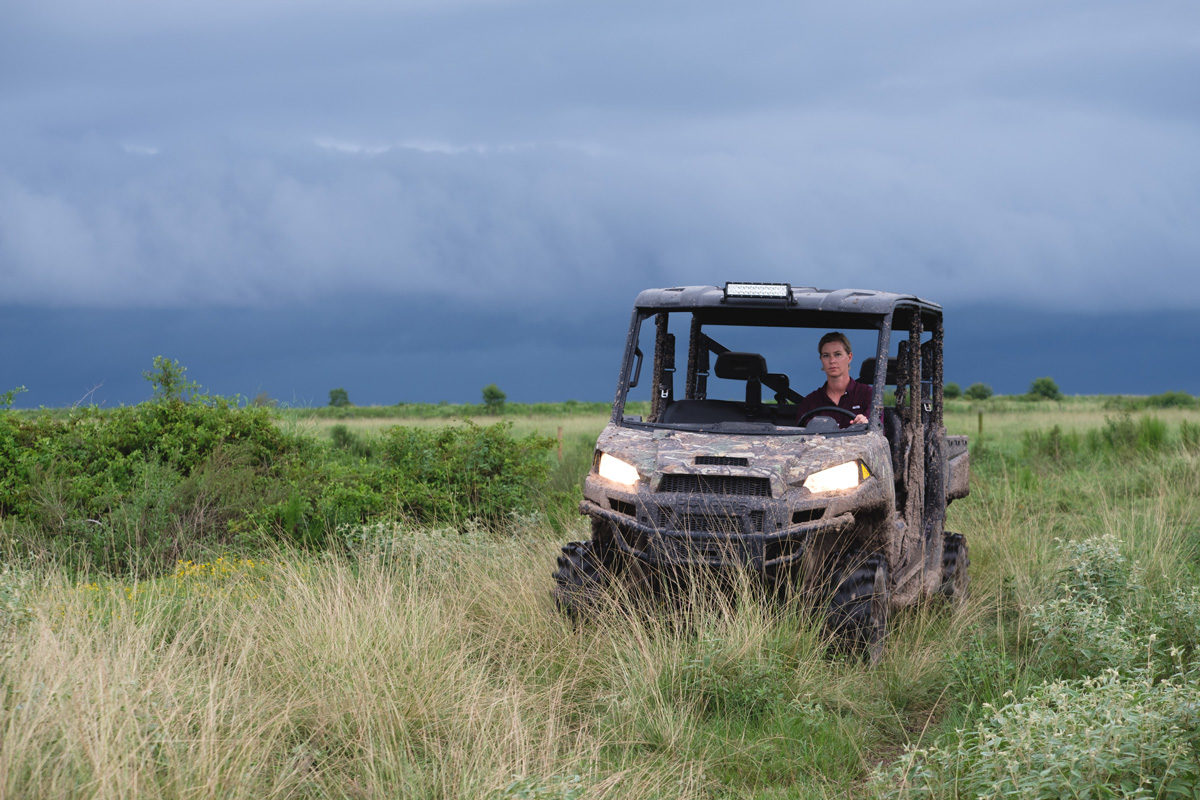
TRCP: So, why take people hunting to get them support the project?
EASTERLY: I think it helps to highlight hunting and conservation as a nice marriage of ideals. Actually bringing guests out into this fantastic waterfowl habitat to do something they enjoy helps them understand what we’re doing and why expanding the refuge is such a big win for Texas.
The habitat is unbelievable. The ranch is a key part of the largest contiguous marsh system in Texas, which buffers inland communities from saltwater intrusion and sends freshwater flows to the rest of the refuge. When The Conservation Fund purchased the land, it had been managed to almost pristine condition by the previous owner, and here’s how we could tell: Just three weeks after Hurricane Harvey in 2017, this land was bone dry. The wetlands were working exactly like they are supposed to, filtering stormwater and pushing it out to the Gulf cleaner than it was before.
I believe every problem in the world can be solved with education, and taking people on an epic hunt rarely fails to make people feel like we’re all in this together. The hunt itself is really fun, but it’s also a palatable introduction to conservation for many people.
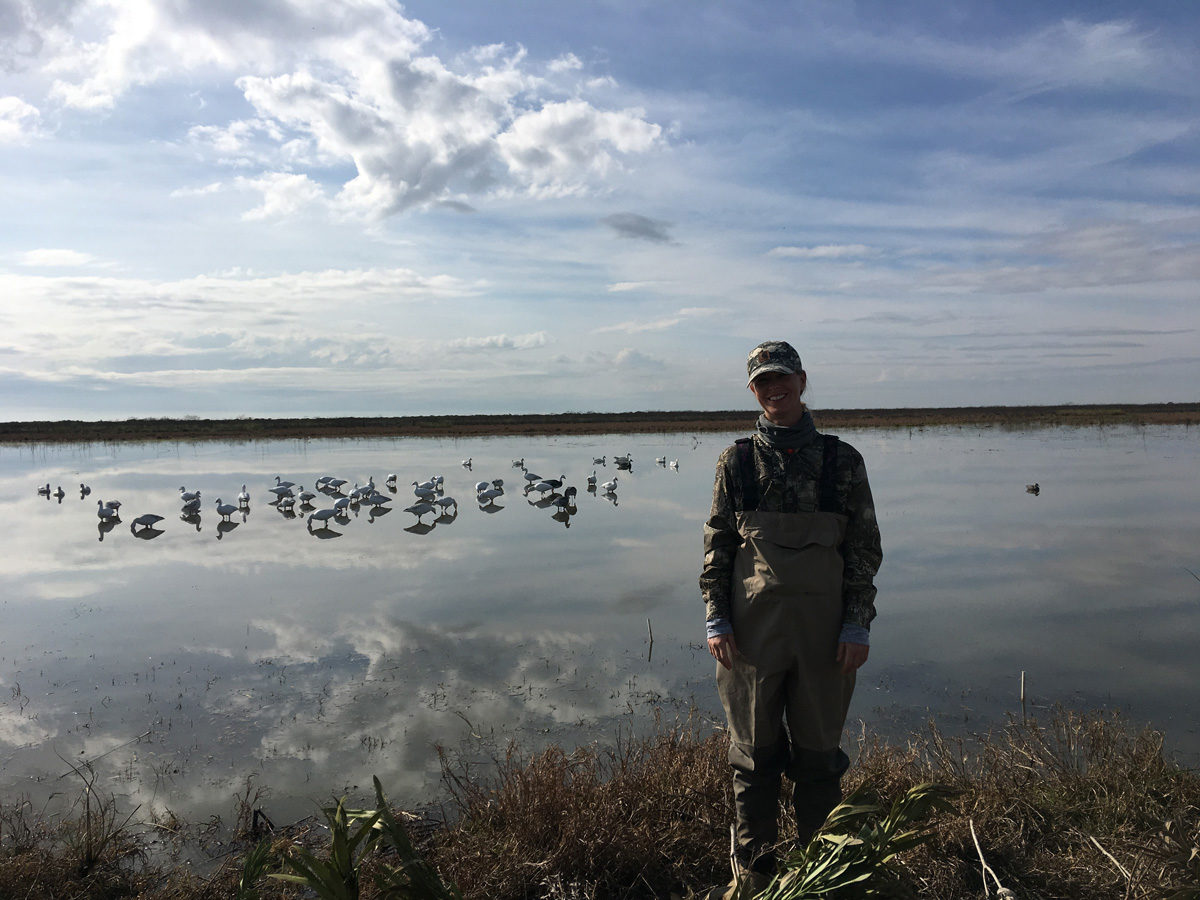
TRCP: How do you think we can do a better job, as conservationists?
EASTERLY: We need to tell better stories. We need to broaden our target audience and, as nonprofits, be more accepting of smaller gifts—we’ll meet more potential champions in the process. I talk to young people and see what resonates with them. I might practice a pitch with a friend who doesn’t hunt and just watch for the moment they raise their eyebrows.
For a long time, the environmental movement has meant “no, no, no.” That “no” has alienated a lot of folks. We have to say “yes” sometimes. Cities have to grow, so we explain why some places should be conserved. You illustrate how the health of habitat and wildlife is connected to the health of cities. We paved over some prairies and now there are no geese; there’s no hunting. Houston didn’t grow up, it grew out—we paved over wetlands and now we’re flooding. You explain that it’s hard to go back.
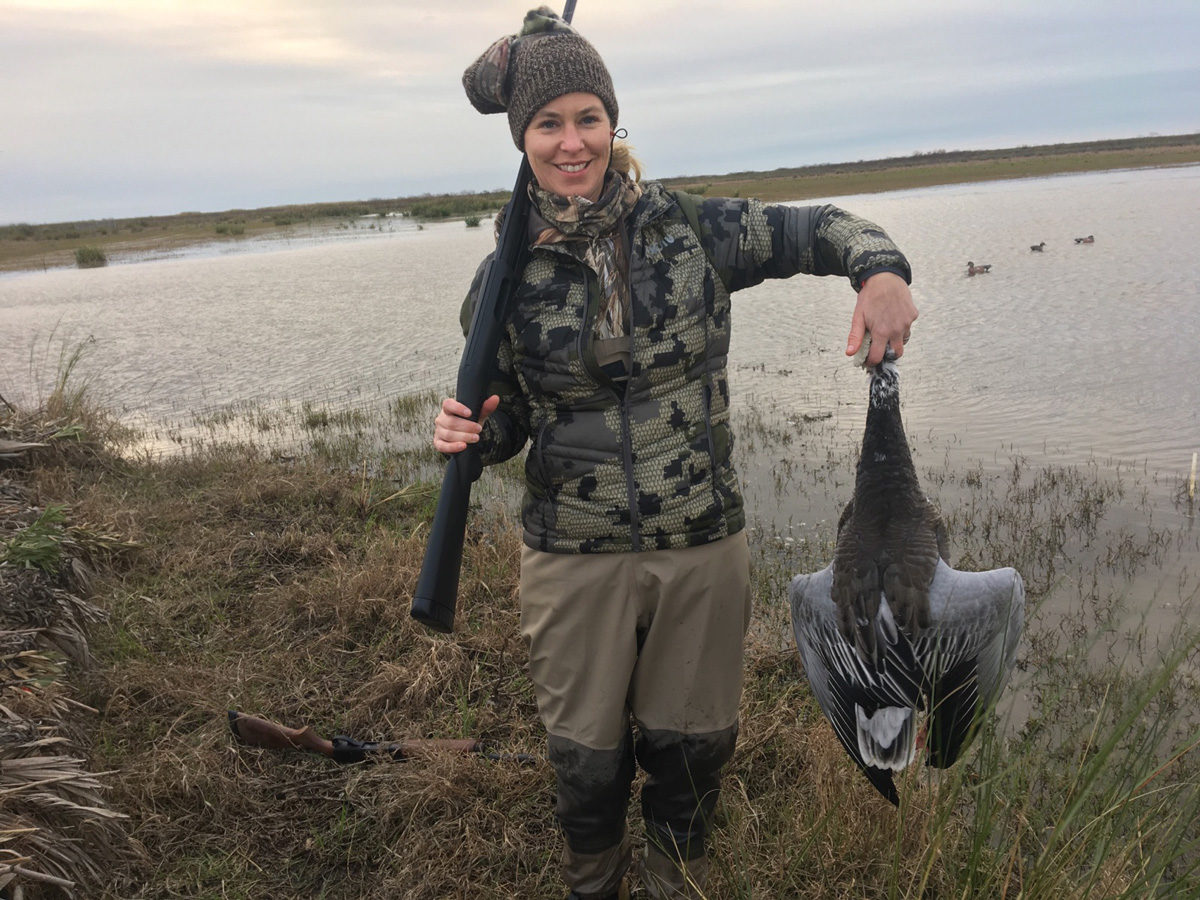
TRCP: So many women are taking up hunting in adulthood because of their interest in knowing where their food comes from. How can a beginner find the confidence to get outside on her own and just go for it?
EASTERLY: I’ve felt that lack of confidence, too—you have to give yourself over to it and allow yourself to make mistakes. You’ll miss. You’ll use the wrong fly. It’s trial and error. The moments you improvise because you forgot some gear or fall in and get soaking wet are going to be the most memorable anyway.
I don’t know how we tell ourselves it’s OK to fail. All I know is that sometimes you’re in the marsh getting eaten alive by bugs, and you’re calling and calling and nothing comes in. It’s not your spread, there’s just no ducks. It won’t be the most epic experience every time.
So, focus on the camaraderie of being up before dawn, passing a thermos of coffee around, being cold and sleepy together, telling stories, and watching the sun rise with friends. You can’t force the perfect hunt. In the morning, when you’re excited about the mere possibility of what the day may hold—make that feeling endless.
Photos by Shannon Tompkins
Bipartisan legislation would permanently reauthorize LWCF and support outdoor economy
Leading conservation organizations and hunting and fishing groups are celebrating Senate passage of a critical public lands bill, which would permanently reauthorize the Land and Water Conservation Fund and support other important conservation programs.
43 groups recently called on the Senate to vote on the bipartisan legislation (S.47) that was negotiated by U.S. Senators Lisa Murkowski (R-Alaska) and Maria Cantwell (D-Wash.) last Congress.
“Today’s vote sends a strong message that we can find consensus in our support for our public lands,” said Whit Fosburgh, president and CEO of the Theodore Roosevelt Conservation Partnership. “The Land and Water Conservation Fund has united sportsmen and women, businesses, and conservationists, because we all know how important it is to the future of public lands access. We urge the House to build upon this momentum and work together to pass legislation that permanently reauthorizes LWCF and strengthens our outdoor recreation economy.”
“Today’s vote is a big step toward ending the cycle of uncertainty that has plagued America’s best conservation program,” said Kameran Onley, director of U.S. Government Relations at The Nature Conservancy. “The overwhelming vote in favor of reauthorization reflects the Land and Water Conservation Fund’s long track record of success and broad support from lawmakers, landowners, conservation organizations and state and local officials.”
“We thank the Senate for prioritizing wildlife and conservation at the beginning of the new Congress with the passage of S. 47,” said Howard K. Vincent, president and CEO of Pheasants Forever and Quail Forever. “This measure includes several of our top legislative priorities including the WILD Act which reauthorizes Partners for Fish and Wildlife and the Land and Water Conservation Fund. Both LWCF and Partners for Fish and wildlife have been critical to our ability to promote mission and create hunter access and opportunity. We appreciate the Senate’s hard work and look forward to getting it to the President’s desk as soon as possible. ”
“It’s a new year in the U.S. Senate and we finally have a living, breathing and bipartisan public lands package, which will preserve thousands of acres of land for outdoor recreation, permanently reauthorize the Land and Water Conservation Fund, help get more kids outside and much more to support our nation’s $887 billion outdoor recreation economy,” said Patricia Rojas-Ungar, Vice President of Government Affairs of Outdoor Industry Association. “We applaud the tireless efforts of many in Congress, the outdoor industry and Americans who value the outdoors for their efforts to move this package across the finish line. While we aren’t done yet, we are close, and urge the House of Representatives to act quickly to pass the public lands package and fund America’s outdoors.”
“For decades, LWCF has been the go-to tool to implement public lands conservation and facilitate access to outdoor recreation in this country,” said Jared Mott, conservation director of the Izaak Walton League of America. “Permanently reauthorizing this incredibly successful program is a critical step in the ongoing effort to protect our public lands. We commend the Senate for the passage of S. 47 and thank Chairman Murkowski for prioritizing this important public lands package so early in the 116th Congress. We look forward to working with the House of Representatives and all of our partners to get a bill permanently reauthorizing LWCF to the president’s desk as soon as possible.”
“What’s more all-American than our public lands and waters? Today’s vote by the Senate represents progress for the public lands sportsmen and women and others who have advocated for exactly this outcome – and shows the broad-based support popular programs like the Land and Water Conservation Fund have generated both with lawmakers and citizens alike,” said Land Tawney, president and CEO of Backcountry Hunters & Anglers. “The House of Representatives should take notice and follow the Senate’s lead by expediting the passage of this results-oriented package of bills to the president’s desk.”
“The Senate’s overwhelming support for the Natural Resources Management Act once again proves that conservation and outdoor recreation are bipartisan, commonsense issues,” said Nicole Vasilaros, senior vice president of Government Relations and Legal Affairs of the National Marine Manufacturers Association. “This critical legislation permanently reauthorizes the Land and Water Conservation Fund – a measure that will responsibly enhance access to recreational fishing on our nation’s public lands and waters – and we thank Senators Lisa Murkowski, Maria Cantwell, and Joe Manchin for championing this effort and call on the U.S. House to immediately pick up, pass, and send this bill to President Trump.”
“As hunters and committed conservationists, falconers depend on the raptors we employ, the prey species they pursue, and the public lands needed to enjoy our unique hunting heritage,” said Sheldon Nicolle, president of the North American Falconers Association. “The North American Falconers Association applauds the Senate on the passage of this historical step forward for public lands and conservation.”
“AFFTA has long stood by access to, and the conservation, restoration, and protection of, our public lands and waters,” said Ben Bulis, president of the American Fly Fishing Trade Association. “We applaud the Senate’s bipartisan support of the lands package, including the permanent reauthorization of the Land and Water Conservation Fund and Yellowstone Gateway Protection Act, which are so critical to our industry. This is a great day for our nation’s public lands and waters. We urge the House to take up the bill quickly and follow the Senate’s lead.”
The group’s letter to the Senate can be found HERE.
Photo courtesy of National Park Service’s Megan Richotte.
Theodore Roosevelt’s experiences hunting and fishing certainly fueled his passion for conservation, but it seems that a passion for coffee may have powered his mornings. In fact, Roosevelt’s son once said that his father’s coffee cup was “more in the nature of a bathtub.” TRCP has partnered with Afuera Coffee Co. to bring together his two loves: a strong morning brew and a dedication to conservation. With your purchase, you’ll not only enjoy waking up to the rich aroma of this bolder roast—you’ll be supporting the important work of preserving hunting and fishing opportunities for all.
$4 from each bag is donated to the TRCP, to help continue their efforts of safeguarding critical habitats, productive hunting grounds, and favorite fishing holes for future generations.
Learn More
